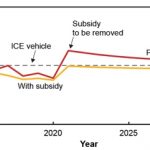Published in March, the IPPC’s AR6 Synthesis Report on Climate Change updates its predictions of the effects of temperature rises. It starkly concludes that those temperature rises will have a bigger impact at lower temperatures than previously predicted. Charlotte Edmond, writing for the World Economic Forum, picks out five charts from the report to illustrate the point: the range of likely temperature rises; global map of change in temperature, … [Read more...]
Health benefits of Wind Power: first replace the most polluting fossil plants, not the most expensive
It makes economic sense, when intermittent wind (or solar) generation rises, to turn down the most expensive fossil plants. Or does it? Join the dots to health costs and it may make more economic sense to turn down the most polluting plants first. Jennifer Chu at MIT describes research there that creates models and scenarios to interrogate that theory. Using hourly generation records, pollution and health cost data from across the U.S. they found … [Read more...]
Pollution costs are driving U.S. states to look for alternatives to Gas-Fired Plants
In the U.S. a growing number of states and regulators are directing utilities to look for alternatives to proposed gas-fired power plants, citing environmental justice and community health impacts, explain Caitlin Odom and Lauren Shwisberg at RMI. So it’s not just about emissions: pollution matters too. The authors quote studies that show clean energy portfolios (CEPs) not only reduce energy costs, but can save billions of dollars in community … [Read more...]
Pathway for 100% Renewables in 24 U.S. states by 2035
We should not be surprised to see a growing number of 100% renewables roadmaps, with target dates in the 2030s, from nations as the transition gains pace. This study, “On the Road to 100 Percent Renewables” led by The Union of Concerned Scientists (UCS), details how the 24 states that make up the members of the U.S. Climate Alliance (USCA) can meet all of their electricity needs with renewable energy by 2035. Paula Garcia at UCS summarises the … [Read more...]
Wellbeing peaks at just 75GJ per capita: a reachable target for poorer nations to rise to (and rich ones to fall to)
Energy consumption is strongly linked to health and wellbeing, in particular life expectancy, infant mortality, happiness, food supply, access to basic sanitation services and access to electricity. But as Josie Garthwaite at Stanford University explains, new research is saying that those improvements cease above a certain number of gigajoules per person per year. Knowing that number will make understanding and setting targets much easier. For a … [Read more...]
All estimates of the ‘cost’ of climate action should include the savings and benefits
Too many climate mitigation scenarios calculate the cost of that transition without measuring the savings and benefits, explain Alexandre Köberle and Joeri Rogelj at Imperial College London, Toon Vandyck at the EC's Joint Research Centre, and Celine Guivarch at the Centre International de Recherche sur l’Environnement et le Developpement, writing for Carbon Brief. This leads to a pessimistic view of the challenges ahead, and public aversion to … [Read more...]
Why sustainable Buildings are critical for a resilient, healthier society
Europe and its Member States are committing large sums to buildings renovations. The policy emphasis has been on insulation, energy savings and emissions reduction. The latest Healthy Homes Barometer 2022 by Velux draws attention to the health benefits of renovations that target damp, lack of daylight, excess noise or cold, and other indoor climate hazards. To get an idea of the scale of the problem, 34 million Europeans are unable to keep their … [Read more...]
Gas Crunch: time to factor in volatility and externalities to reveal its true costs
The current gas price shock (and any future ones) raises the question: if we had invested more in renewables, efficiency, buildings renovation, and green gases, would we be actually saving money instead of losing it? Looking at the EU, Dolf Gielen, Michael Taylor and Barbara Jinks at IRENA urge governments to do something they’ve not done before and factor in the negative impacts of volatile fossil fuel prices. Moreover, they should calculate the … [Read more...]
China’s car sales target: 40% EVs by 2030 will cost CNY 100bn/year (€13bn, $15bn)
By the end of the 2020s China will phase out EV subsidies and instead rely on a mandate imposed on manufacturers to target 40% of car sales being electric by 2030. Nancy Stauffer at MIT reviews a study that estimates the new rules will result in 66m EVs sold in China in the next 10 years. That will move EVs well into the mainstream and have global consequences. According to the study, the total cost of that transition will be 100bn yuan/year … [Read more...]
Coal exit saves money when public health, land degradation costs added – analysis
Coal is cheap. In countries historically reliant on it, as well as emerging economies still building plants, switching to cleaner energy just doesn’t seem to add up. That’s when you’re only looking at your national energy system costs. But the externality costs of air pollution, public health and a degraded local environment are rarely factored in to the equation. When they are, explains Sebastian Rauner writing for Carbon Brief, abandoning coal … [Read more...]











